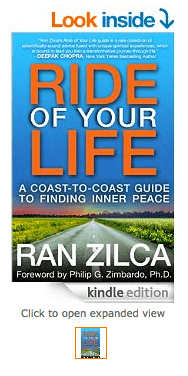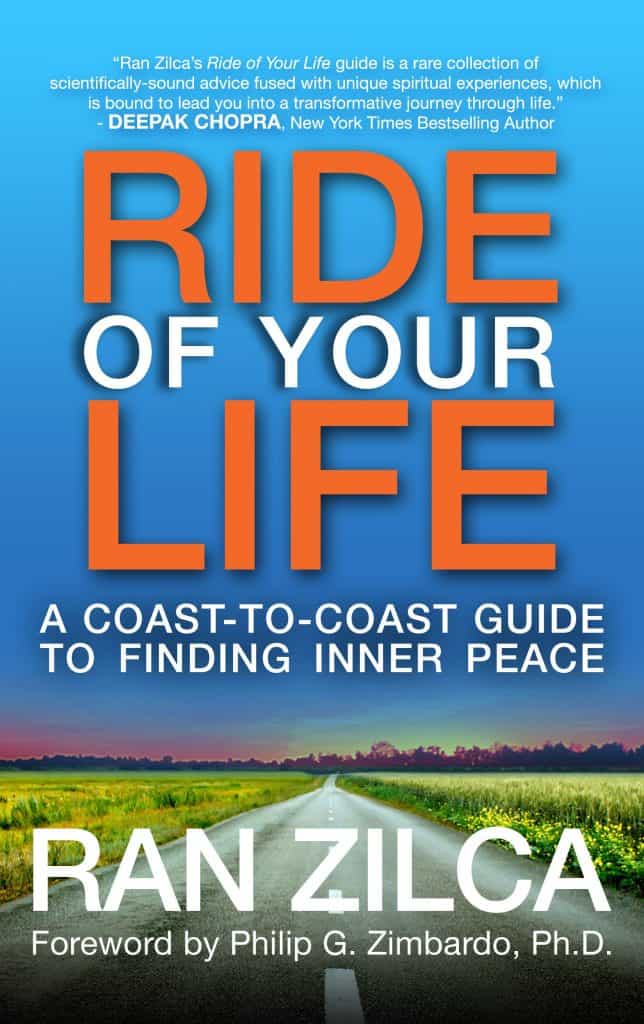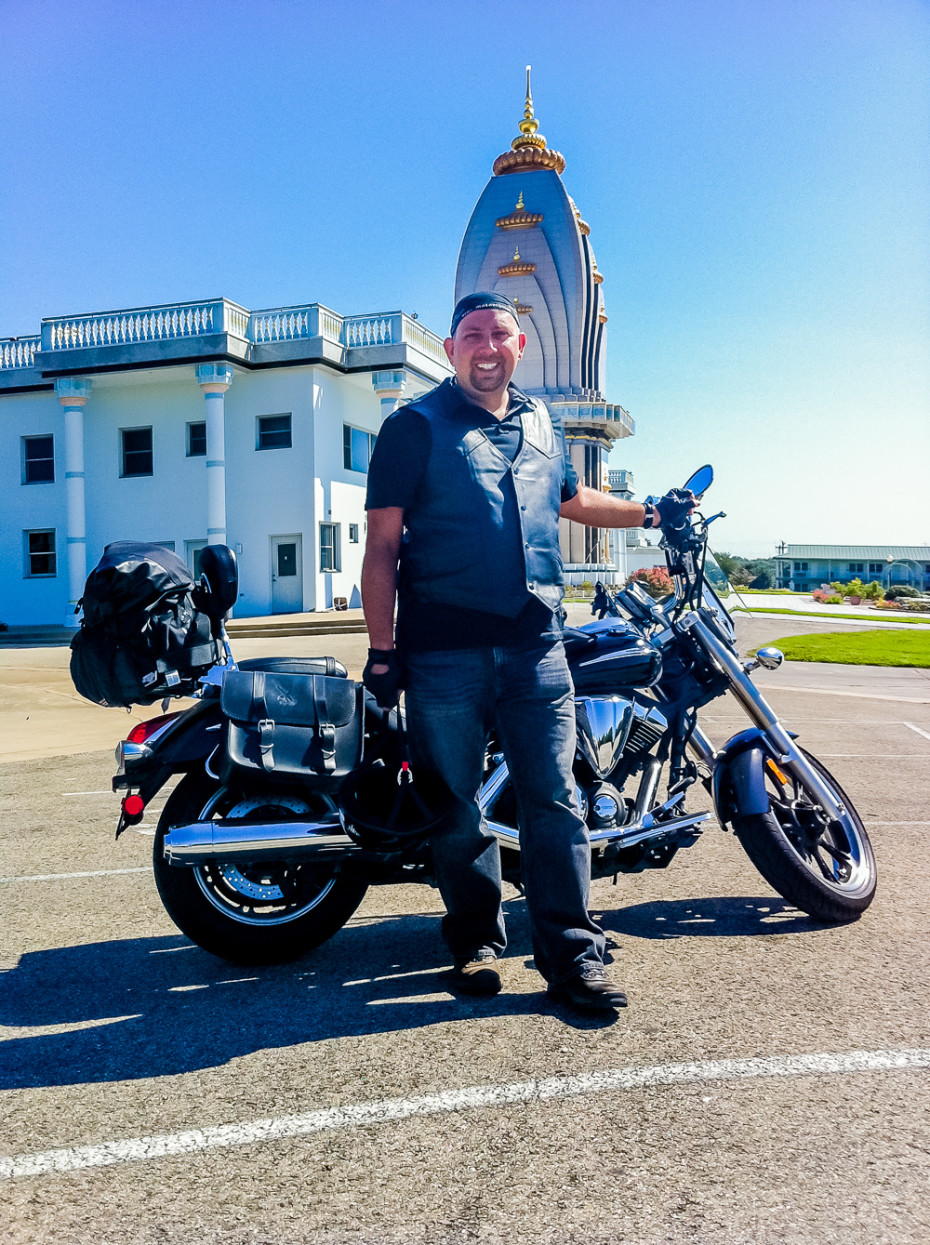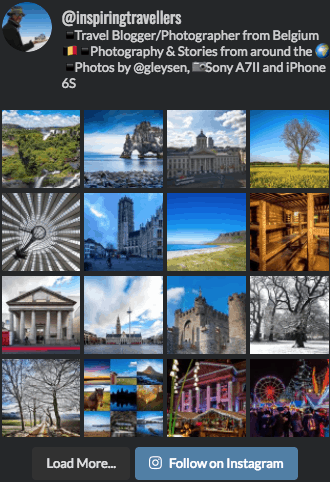This week I got the chance to interview Ran Zilca, the author of Ride of your life. The book follows Zilca’s coast-to-coast motorcycle journey, describing the meditative experience of traveling the country’s back roads and his life-changing conversations with seven prominent positive psychologists and personal growth leaders, including spiritual leader Deepak Chopra and bestselling author Byron Katie, the creator of the self-inquiry method called The Work.
I really enjoyed reading his book, because I’m also soul-searching in my current life as a freelancer and travel blogger and it helped to reflect my own personal challenges.
Besides the interview, Ran also provided Inspiring Travellers with the opportunity to give away an e-copy of the book to three lucky readers! You can find out how to win your copy at the end of the interview at the bottom of this page.
But let’s start with the interview first:
– What inspired you to take the ride of your life?
Most of all, the realization that I needed to redefine who I am as I grow older and move to the next chapter of my life. At the time, being a successful entrepreneur I supposedly had reached my goals, but then realized that I became their captive- having to conform to a certain daily routine and a certain way of living that this success dictated. I needed to take a break from the normal course of my life so I can gain some clarity and familiarize myself with my future self, no longer a young adult but already an experiences midlife man. To become a “midlife mensch”, in short.
– How planned was your journey, and how much planning to you suggest people do when they set out on a trip like this?
One of the major insights form Ride of Your Life is to plan meticulously for the road ahead, and on the first day on the road dump the plans altogether.
This seems like the best way to go for a few reasons: First, planning for an adventure could be as rewarding as taking the adventure, so if you plan for months ahead, you are essentially extending the duration of your adventure and starting it on the first day of planning. This was also reinforced by what Sonja Lyubomirsky told me when I met with her in California, at the end of the Ride – that the planning process is a great way to extend the experience.
The second reason is that when you plan it forces you to think more in-depth about the meaning and purpose of what you do, so when you go on the road it takes a more meaningful form.
But most importantly, is to really dump the plans altogether as soon as you get on the road, because everything is different, and you need to be flexible and unattached to your plans, and you encounter the most pleasant surprises when you truly listen to the road and let it take you where it should. The most interesting and epic parts of my journey came from the random turns to side roads.
– How important is flexibility on the road?
Flexibility is everything on the road. When you’re on the road on your own, you realize that the road has its own plans for you, and if you don’t open your eyes and ears and listen to it, you miss out of the best places to go. The best mindset you can adopt is that of an explorer. Someone who is entering unchartered territory and learning it for the first time.
When I met with Deepak Chopra he and I discussed the notion of “inner strength”. He told me that he never uses the word “strength” in his vocabulary, and uses “flexibility” instead: “I have a favorite saying that comes from the Yoga Vasistha, “Infinite flexibility is the secret of immortality.” It’s, in a way, an evolutionary principle that you adapt. It’s not the strong who survive, but the ones who adapt. An oak tree is very strong but with the first storm, it may crack, whereas a little thin vine that is flexible will survive the same storm.”
– One of the guest posters on InspiringTravellers.com talked about overcoming the fear of travelling, what would be your advice?
In the book, when I describe the first day, it is a mixture of fear, confusion, and embarrassment. I believe that this fear is, in fact, one of the characteristics of the beginning of the most rewarding adventures. So one has to embrace fear, to realize that the experience of fear while on the road (whether literally or metaphorically) is an indication that you are doing the right thing, getting outside your comfort zone, and truly going on the road.
– Both Caroline Miller and Phil Zimbardo talk about traveling out of your comfort zone because the regret of not-doing is far greater than regrets of failure. Deepak Chopra calls it expanding your comfort zone. How did you leave your comfort zone and what was your proudest moment on the road?
The beautiful thing about riding a motorcycle, is that it forces you to go outside your comfort zone. On the 8th day of Ride of Your Life, I had to ride in pouring rain from Tennessee, through Georgia, to Alabama. I had not ridden in rain before at all, and I was terrified initially. Accordingly, the pride I felt that night (matching the level of challenge and initial fear) was sky high, and to a large extent it remained with me to date. Sometimes when I face a crisis or a challenge at work or in my personal life, I remind myself of how I rode in pouring rain through three states and made it.
– How was it different to travel alone? Do you suggest that people travel alone from time to time?
Phil Zimbardo and I discussed this when we met, and agreed that it is absolutely necessary to spend time traveling alone. The fact that you experience things and absorb them without verbalizing or sharing them with other travel companions, makes a huge difference. And – people talk to you when you travel alone, so you develop the capacity to connect to new places very quickly.
– What are the most important lessons you learned from the road?
I list the major insights in the first pages of the book, but the biggest one is that “comfort kills”. Living (as opposed to simply being alive) means to experience the friction against life. To feel negative emotions like guilt and fear, and to face challenges. To live means not only to laugh and to rest, but also to sweat, cry, lift, push, get frustrated, and be afraid. And if you deny yourself of this range of life experiences, you reduce the friction with life to become comfortable, you may still be a live, but at that point you stop living. So essentially – comfort kills.
– Can you share some inspiring moments from your trip?
My meeting with Deepak Chopra at the Chopra Center in Carlsbad was one of the most insightful and inspiring. At that point I was already towards the end of the ride, over a month on the road, and I could ask the “right questions” and was ready to absorb the unusual views that Deepak sometimes expresses. It was one of these moments where the student was ready and the teacher was right there.
Another pivotal moment was when I entered Yosemite National Park, the day before I arrived in San Francisco. I parked the motorcycle at the side of the road, and looked at the snow-covered summits. The beauty and scale was so vast and so different from anything I had ever seen before, that I felt that I could not contain it. The only way to let it all in, was to stop looking at it as something external to me. To truly feel like I am one with the world around me.
– Many people feel like they want to introduce change in their lives, but they are not sure how to go about it. What do you suggest?
My advice (that I also discuss in the talk I gave at TEDx Russell Square (see video below) is to go about it in a very structured way. To start creating a vision, break it down into goals, and then into small baby steps, that you can take immediately. The trick is to break down a grand vision into small, daily tasks, and this is where many people fail. Often it is useful to use a life coach who can help you go through this process, and I was fortunate to help others go on the ride of their life.
– In your book, you mention that dreams matter. Now that you have finished this road trip, what dream are you still pursuing? What is your next adventure?
That is a great question, and it excites me just to think about it. Writing, speaking, and coaching has become a big part of my life. I started writing weekly on PsychCentral recently and my work is very focused on language as a transformative engine for changing lives. My next adventure is to create the technology that uses language in a smart way to help people change. I already started this work with collaborators in the research community, and I think that it can take many people on the ride of their life. I am also starting to think about my next book.
– Any final words or advice for the readers of Inspiring Travellers?
Choose your words wisely when you talk about your life. If you stop talking about “dreams” and instead start talking about “plans” your life wil change before you know it.
About Ran Zilca
Ran Zilca is a research scientist, technology entrepreneur, and certified personal coach, who pioneered the use of mobile applications to deliver programs of positive personal transformation. With a combination of psychological research and computer science, Ran’s companies develop innovative programs of personal growth and have worked closely with partners like Deepak Chopra and Stephen Covey. His research in engineering and psychology has been published in major scientific publications in the past 22 years, and his weekly posts on major blogs attract hundreds of thousands of readers each month.
Ran is a loving husband and father of three, a guitar player, and a biker. In the course of his work, he developed a step-by-step process of personal transformation and followed it in his life. The result was a 6,000 mile solo motorcycle ride across the country, a new book, the sale of his company, and a move to a different continent.
 | Published by Booktrope, Ride of Your Life is available now on Amazon.com . |



